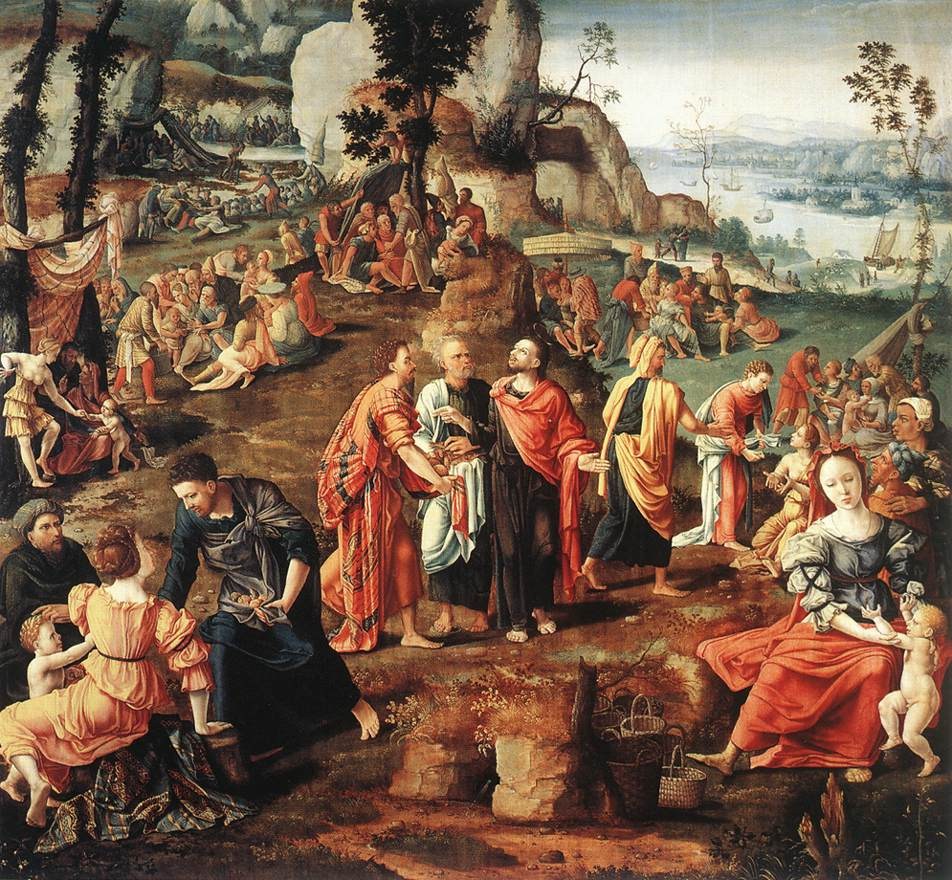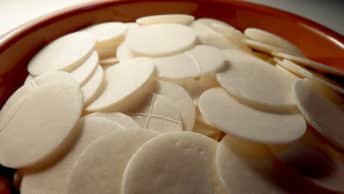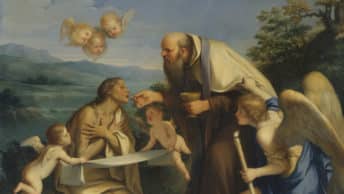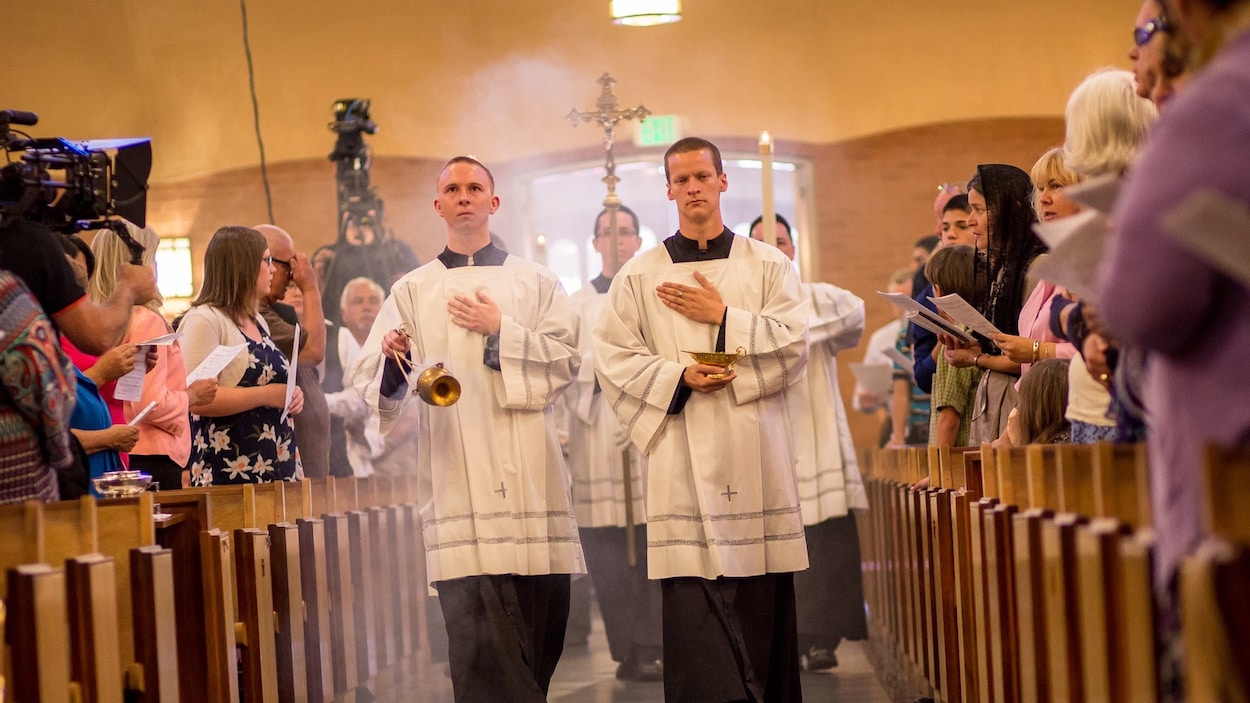
Today the Church celebrates the feast of Corpus Christi, the day we commemorate the institution of the Holy Eucharist, the most precious and holy Body and Blood of Christ. We are also in the middle of the graduation season. Many are now stepping off of that graduation stage and into the world of an unknown future. So I address my message today primarily to the graduates, but it can also apply to all of us.
In today’s Gospel text we hear the ever familiar story of the multiplication of the five loaves and the two fish. Yes the story reveals the creative power of our Lord Jesus, but there is a more profound message for us in this story. It is obvious that the disciples did not fully understand who Jesus was at this point. They had a very limited vision of His true identity. Consequently they did not fully understand the power and responsibility that was theirs, and who they now were, as one of his disciples. We too can be at risk of suffering from a similar lack of understanding.
The Scriptures refer to Jesus as the Word, and the Scriptures tell us that “In the beginning was the word; the Word was in God’s presence and the Word was God. He was present to God in the beginning. Through Him all things came into being, and apart from Him nothing came to be.” (John 1:1-3)
In the original Greek manuscripts, the word used there to refer to Jesus was the word Logos. The Greek word Logos is translated as “Word”. The term Logos was commonly used and understood by both the Greeks and the Jews during the time of Christ. For the Jews, when the term Logos appeared in their Torah, our Old Testament, the Logos was understood to mean or describe or personify the instrument used to carry out the will of God. For the Greeks, the term Logos was used to describe the agency or the means by which God created material things. So by identifying Jesus as the Logos, or the Word, Scripture is not only identifying Jesus as the mediator between God and creation, Scripture is also identifying Jesus as the Creator, literally our God in human form, fully human, yet fully divine.
Today’s Gospel text tells a story that provides us with an example of the creative power of Jesus. But to more fully appreciate the power and creative genius of the Word, we need to do more than just read about it. We need to experience it ourselves, firsthand. And for me, the best way to do that is to simply look up into the night sky. When I look at all those stars, and try to comprehend what my eyes are seeing, I am not only amazed by the vastness of His creation, I am reminded of how seemingly small and insignificant we all are. The sheer magnitude of His creation is beyond our comprehension.
The universe is so big and the distances are so great that it boggles the mind. For example, the moon, our closest neighbor, is so far away that if we travel there at the speed of a rifle bullet, it takes us three days to get there. As big as that distance is, the distance to our sun is over 100 times greater. Our sun is a star, but our nearest neighboring star, Alpha Centauri, is 4.3 light years away or 271,000 times greater than the distance to our sun. Science says that our own Milky Way galaxy may contain as many as 400 billion stars and it is over 100,000 light years across. And there are billions of galaxies. As I said earlier, when you look at creation that way, we do indeed appear very small and insignificant.
If we were asked to summarize the purpose of the life of Christ, to explain why our God would come to earth and become a part of this seemingly insignificant humanity, I am sure our answers would be varied. But the Scriptures make it clear that Jesus’ primary mission was to reveal and promote the Kingdom of God. The Gospel text that we read today even starts by pointing out the fact that Jesus had just finished speaking to the people about the Kingdom of God.
Jesus also said that God is our Heavenly Father and that He loves each and every one of us, His children. In comparison to the cosmos, we are indeed incredibly small, but in the eyes of our Heavenly Father we are not insignificant. We are all His sons and daughters and each and every one of us is priceless in our Father’s eyes.
So what is our responsibility as children of God? We who live in this incredibly vast universe that He created? What does our Heavenly Father expect from us His children? The answer to that question is easily answered if we think of the Kingdom of God as God’s intentions for the universe. Simply stated, the Kingdom of God is a Kingdom that exists wherever God’s will is at work. And God’s will is at work among His people whenever and wherever people are faithful to His command to love one another as He first loved us. Citizens of this kingdom are therefore called to live the way that Christ lived and think the way that Christ thought.
Did you notice Jesus’ response when the disciples suggested that Jesus dismiss the crowd so that they can go and find some provisions for themselves? His response was an important message for the disciples, and it is an important lesson for us today. Jesus said, “Give them some food yourselves.” (Luke 9:13) Jesus wasn’t being sarcastic. And He was not ignorant of their limited provisions. In hindsight, we are privileged to know His true identity, but the disciples did not as of yet possess that understanding. Obviously Jesus knew their situation. So why would Jesus make a statement like that? The only possible explanation is that Jesus was in fact giving His disciples power over the situation. But the disciples were clueless. They missed the point. They responded by telling Him what He already knew. But Jesus doesn’t scold them for their lack of understanding. He simply takes over the situation and feeds the multitude.
The disciples had spent a considerable amount of time with our Lord, being taught, and receiving instruction. We can only imagine what it must have been like to receive instruction from the Creator of heaven and earth Himself, who was right there with them in the flesh. Jesus was in effect now saying, “I’ve instructed you, I’ve fed you with the Gospel of truth, I’ve empowered you, and I’m right here with you. Now take the empowerment that you have been given, have confidence in My presence here with you, and use that to feed the multitude yourselves.”
We need to look at our life in the same way. All of life’s experiences are meant to serve as instructions. Some of those learning experiences have been enjoyable and some of those learning experiences have been painful. Some of that instruction has been at the hand of professional educators. Some of that instruction has been at the institute of life. But all of it, put together, has worked to develop us, individually, into who we are today. Think of each day as a graduation day. And picture in your mind the Creator of heaven and earth, standing there in front of you at your commencement ceremony, and telling you to, “Go forth. You have been empowered by the instruction you have received. This knowledge and wisdom that you have been given is like love. It is worthless unless it is shared with others. You, therefore, have a responsibility to use what you have been given in the service of your fellow man. So take what you have been given and give the multitude some food yourselves.” That is an incredibly humbling thought. And if you seriously consider it, I’m sure that your thoughts might be similar to mine. “But who am I? I’m just little old me. I have so little to offer.”
Each of us has received instruction. How much of that instruction have we comprehended? How much of that instruction have we retained? Whatever is left, what little we may feel that we still possess, God is asking us, each and every day of our life, to take what we have, bless it and break it and distribute it to the multitude. Some may not like what we have to offer, but many more will find it nourishing and will be blessed by it.
Remember, Jesus said that He would not leave us as orphans. He said that He would be one with us, just as He and the Father are one. By our baptism, each of us is a temple of His Holy Spirit. And He is continually present among us in the Eucharist. So we are not alone in our mission. Just as Jesus was right there with the disciples, so too is He there with us in our mission. That’s what it means to be a citizen in the Kingdom of God. We are to live the way that Christ lived, to think the way that Christ thought and to “feed” the multitude as He did.







